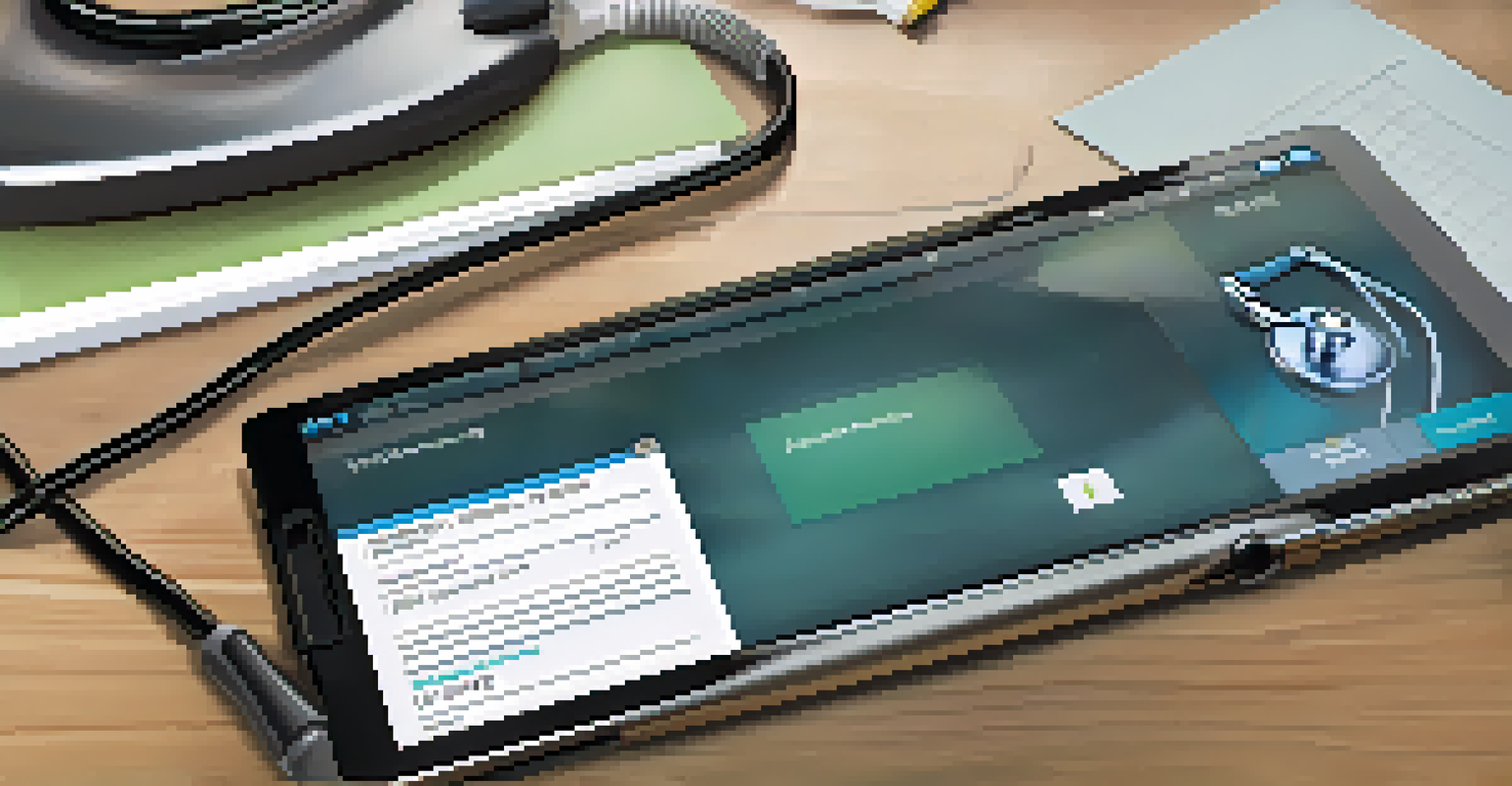The Benefits of Cloud-Based Electronic Health Records

What Are Cloud-Based Electronic Health Records?
Cloud-based electronic health records (EHR) are digital versions of patients' paper charts, stored securely online. This means that healthcare providers can access patient information from anywhere, provided they have internet connectivity. Imagine being able to review a patient's history while on the go, without being tied to a physical location.
The future of healthcare lies in the digital transformation of patient records and care delivery.
Unlike traditional EHR systems which may require expensive servers and ongoing maintenance, cloud-based systems are hosted by third-party vendors. This not only reduces costs but also minimizes the burden on healthcare facilities to manage their IT infrastructure. It’s like having a professional team handle your tech needs while you focus on patient care.
Moreover, these systems are designed to be user-friendly, allowing healthcare professionals to spend less time navigating software and more time engaging with patients. As technology continues to evolve, cloud-based EHR solutions adapt seamlessly, keeping healthcare providers equipped with the latest tools.
Enhanced Accessibility for Healthcare Providers
One of the standout benefits of cloud-based EHR is the enhanced accessibility it offers. Healthcare providers can access patient records instantly from any device, whether it’s a laptop, tablet, or smartphone. This flexibility empowers doctors and nurses to make informed decisions on the spot, improving patient outcomes.

For instance, imagine a doctor on call who can quickly pull up a patient's medical history during an emergency without needing to rush back to the office. This immediate access can be critical in life-or-death situations, showing just how vital these records can be.
Enhanced Accessibility for Providers
Cloud-based EHR systems allow healthcare providers to access patient information instantly from any device, improving decision-making and patient outcomes.
Additionally, this accessibility fosters collaboration among healthcare teams. Multiple professionals can view and update patient records simultaneously, ensuring everyone is on the same page. It’s this kind of teamwork that can lead to comprehensive, coordinated care.
Improved Patient Care and Engagement
Cloud-based EHR systems enhance the quality of patient care through their streamlined processes. By having all relevant health information in one easily accessible location, providers can make more accurate diagnoses and treatment plans. This holistic view of a patient's health history can lead to more personalized care.
Cloud technology is not just an option; it’s a necessity for the modern healthcare system.
Furthermore, many cloud-based EHR platforms include features that allow patients to access their own health records. This not only encourages patient engagement but also helps individuals take a more active role in their healthcare decisions. Think of it as giving patients a seat at the table when it comes to their health.
With better-informed patients, communication between providers and patients improves significantly. This transparency builds trust and can lead to better adherence to treatment plans, ultimately resulting in healthier outcomes for everyone involved.
Cost Efficiency and Financial Benefits
Implementing a cloud-based EHR system can lead to significant cost savings for healthcare facilities. Traditional EHR systems often involve hefty upfront costs for software and hardware, plus ongoing maintenance fees. In contrast, cloud solutions typically operate on a subscription basis, allowing for predictable budgeting.
Moreover, with fewer IT responsibilities, healthcare organizations can redirect resources to patient care and other critical areas. It’s akin to outsourcing your lawn care; you can focus on enjoying your yard while experts ensure it looks its best.
Improved Patient Care Quality
These systems centralize patient data, enabling more accurate diagnoses and fostering patient engagement in their own healthcare.
In addition to direct cost savings, cloud-based EHR systems can reduce administrative burdens, allowing staff to spend less time on paperwork and more time with patients. This increased efficiency can lead to better overall service and higher patient satisfaction.
Robust Data Security and Compliance
When it comes to patient information, security is paramount. Cloud-based EHR systems are designed with robust security measures to protect sensitive data from breaches. This includes encryption, secure access protocols, and regular updates to safeguard against emerging threats.
Moreover, reputable cloud EHR providers comply with regulatory standards, such as HIPAA in the United States, ensuring that patient information is handled with the utmost care. It’s like having a high-tech vault for your health records, monitored by experts who know how to keep it secure.
By entrusting data to cloud providers, healthcare organizations can benefit from their expertise in cybersecurity. This frees up internal IT resources and allows staff to focus on providing quality care, knowing that patient data is in safe hands.
Seamless Integration with Other Systems
Cloud-based EHRs can easily integrate with other healthcare technologies, creating a cohesive network of patient information. This integration allows for smoother data sharing between laboratories, imaging centers, and specialist practices. Imagine it as connecting all the dots in a puzzle to see the complete picture of a patient’s health.
With such interoperability, healthcare providers can access vital information without unnecessary delays. For instance, lab results can be uploaded and shared instantly, enabling quicker diagnoses and treatments. This timely exchange of information can be crucial in managing chronic conditions or urgent care situations.
Cost Efficiency for Healthcare Facilities
Cloud-based EHRs reduce upfront costs and administrative burdens, allowing healthcare organizations to allocate more resources to patient care.
Additionally, integration with billing systems can streamline administrative tasks, making the entire patient journey— from check-in to treatment to billing— more efficient. This interconnectedness not only enhances patient experience but also boosts the productivity of healthcare teams.
Future-Ready Solutions for Healthcare
As technology continues to evolve, cloud-based EHR systems are built to adapt and grow with the changing landscape of healthcare. These systems can incorporate emerging technologies such as artificial intelligence and machine learning to enhance clinical decision-making. Think of it as having a helpful assistant that learns over time to provide even better support.
Moreover, cloud solutions often receive regular updates and new features without requiring extensive downtime or manual installations. This ensures that healthcare providers have access to the latest tools and capabilities, which can ultimately improve patient care.

By investing in cloud-based EHR systems, healthcare organizations position themselves for future advancements. This forward-thinking approach not only benefits providers but also enhances the overall patient experience, making healthcare more efficient and accessible.